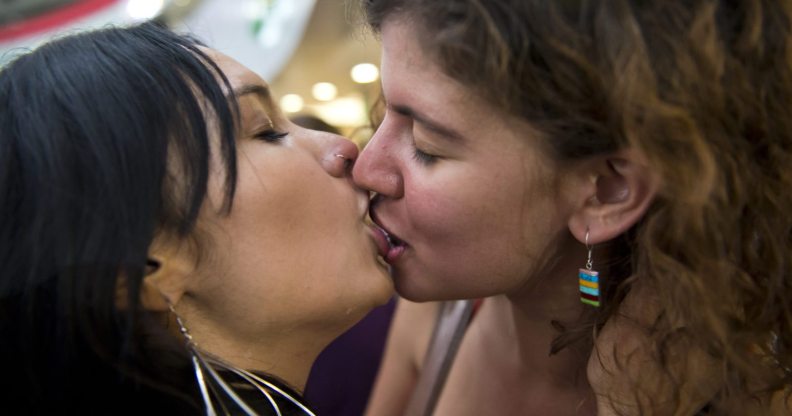There’s no such thing as a ‘gay gene’, scientists find

Two women kiss each other during the International Day Against Homophobia (OMAR TORRES/AFP/Getty)
In the largest study of its kind into the biological basis of sexual behaviour, scientists found there is no such thing as a single ‘gay gene,’ but genetics does have an influence.
The research – which analysed data on DNA and sexual experiences from almost half a million people – found there are thousands of genetic variants that have small effects on same-sex behaviour, but scientists suggested social and environmental factors play a role, too.
The notion of a singular gay gene was first suggested back in 1993, following a singular experiment which was never replicated.
Nearly half a million US and UK adults were found to have five genetic markers not previously linked to same-sex sexual behaviour.
The study, published in Science yesterday, August 29, used data from the UK Biobank and 23andMe to pin down genetic variants.
Scientists scanned the genomes (the genetic make-up) of 409,000 people signed up to UK Biobank and 68,500 registered with 23andMe, a US genetic testing company.
Yet, scientists stressed that genetics can not purely predict someone’s sexual identity. There were no clear patterns among genetic variants that could meaningfully identify behaviour, researchers said.
Genes have a “very small effect” on same-sex behaviour.
Whether genes influence sexuality has plagued scientists and LGBT+ rights activists for decades. To evolutionary geneticists, the idea that a person’s genetic makeup affects their mating preference is routine.
But Harvard and MIT researchers at the Broad Institute – a revered biomedical research centre – found five markers more common in participants who reported having same-sex sexual partners.
Participants were asked whether they have had same-sex sexual partners (even once), as well as opposite-sex partners.
In the five markers, one was linked to the biological pathway for smell, and others to those of sex hormones.
“We scanned the entire human genome and found a handful – five to be precise – of locations that are clearly associated with whether a person reports in engaging in same-sex sexual behaviour ” said Andrea Ganna, a biologist at the Institute of Molecular Medicine in Finland who co-led the research, according to the New York Times.
He said these have “a very small effect” and, combined, explain “considerably less than 1% of the variance in the self-reported same-sex sexual behaviour”.
As a result, researchers suggested, non-genetic factors such as upbringing and personality, might be significant in influencing sexual behaviour.
“I deeply disagree about publishing this.”
Even before it was published, the study generated concern from the LGBT+ community.
A Broad Institute postdoctoral researcher slammed the study.
“I deeply disagree about publishing this,” said Steven Reilly, a geneticist who is on the committee of the institute’s LGBT+ group, Out@Broad.
He added: “It seems like something that could easily be misconstrued.
“In a world without any discrimination, understanding human behaviour is a noble goal, but we don’t live in that world.”
Reilly was not alone in his objections. A series of essays were published by Broad Institute alongside the study which explored the ethical impact of the study.
Fellow Broad Institute postdoctoral researcher Joe Vitti voiced his concern in one essay.
“As a queer person and a geneticist, I struggle to understand the motivations behind a genome-wide association study for non-heterosexual behaviour,” Vitti wrote.
“I have yet to see a compelling argument that the potential benefits of this study outweigh its potential harms.”
“Diversity is a natural part of our experience.”
Advocacy group GLAAD were, however, not as concerned as Reilly.
“This new research also re-confirms the long established understanding that there is no conclusive degree to which nature or nurture influence how a gay or lesbian person behaves,” said GLAAD chief programs officer Zeke Stokes.
However, researchers showed sensitivity to their project, especially when it came to drawing conclusions on the subject.
One trend in the findings was younger participants being more likely than older ones to report same-sex sexual experiences. Possibly reflecting increased social acceptance.
Reilly in his essay noted how these stark differences highlighted the trickiness of trying to draw representative biological information. Moreover, the study sample were all of white European descent, and no trans people were included.
Nevertheless, Benjamin Neale, a lead researcher on the study, was optimistic.
To him, the study demonstrated that “diversity is a natural part of our experience and it’s a natural part of what we see in the genetics.
“I find that to actually just be beautiful.”

